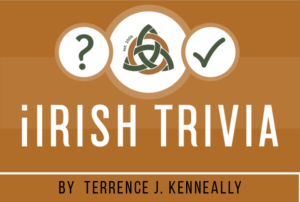
iIrish Trivia, Puzzles, Games & More
Oh the Games People Play Now … Puzzles and Trivia and Shamrock Squares and More
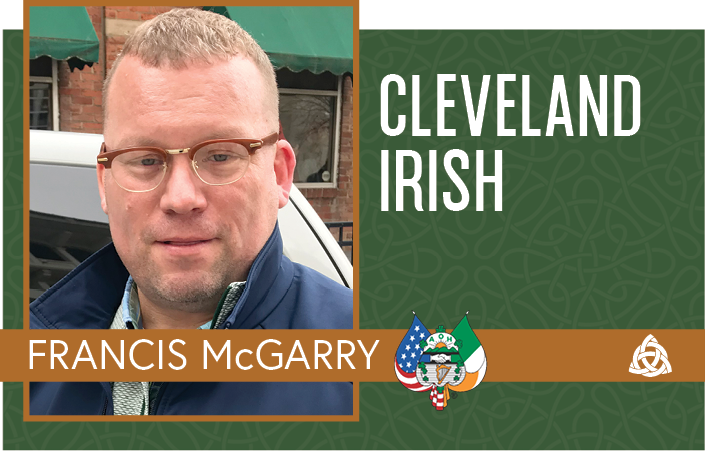
By Francis McGarry
It was June 2, 2000, and Pope John Paul II celebrated the Jubilee for Migrants and Refugees in St. Peter’s Square. The U.S. Bishops called “upon all people of goodwill” to welcome refugees and newcomers.
It was two hundred and ten years before, on April 5, 1790, that the Hibernian Society for the Relief of Immigrants from Ireland was founded in Philadelphia. “To a benevolent mind, no object can be more grateful or more laudable than to relieve the distressed.”
The society had its policies set and elected Thomas McKean its first president. Members went to the docks and met the newcomers to identify those in need.
There was the necessity for support as our brethren arrived along the east coast. It was throughout the entire Irish Diaspora that the Irish newcomers required assistance.
In New Zealand, another organization, The Hibernian Catholic Benefit Society was founded in 1869 to provide mutual aid and support to its members. Those Hibernians have 2,400 members in 21 branches in New Zealand today.
In 1812, 44 Irishmen founded The Hibernian Society of Savannah to tender aid to Irish immigrants. In 1824, these Hibernians, founded Savannah’s St. Patrick’s Day Parade.
That year, Hibernian Society President James Hunter issued a public invitation to all local Irish to attend Mass and join in a parade. It was a success.
Their 100th Anniversary Dinner had President William Howard Taft in attendance. Presidents Harry
The Charitable Irish Society in Boston enrolled 173 members from its inception in 1737 to 1761. It was founded by Irish immigrants from Ulster.
Boston was hostile to all Irish immigrants and all immigration at the time of its founding. The Broad Street Riots in June of 1837 and the 1834 burning of the Ursuline Covent in Charleston highlighted the hostility. Engine 20, a Yankee fire company, and an Irish funeral procession met on Broad Street and the right of way was disputed. When 800 people are engaged in fisticuffs, it becomes a riot.
In those years, up to 1760, members of the Society were restricted to only Protestant Irish. That restriction was removed in 1765.
The years that followed witnessed a unification of sorts. All of the “Irish Nation” was the official membership. Members pledged to assist those experiencing hardship, and any widows of the society.
Those united in charity and cause are united together for that charity or for that cause. The Boston Irish were united in fundraising for Famine relief.
Boston sent $151,000 of the $300,000 sent to Ireland during “Black ’47.” The Society was prudent and welcomed all potential members and endeavored to serve their cause.
This is the letter was published by the Hibernian Society of Baltimore in 1803.
Emigrants are daily arriving from Ireland; many of them are in a friendless and forlorn condition, deprived of health and an asylum. They have a claim upon those who have preceded them, to whom industry has proved propitious. There are many-very many of our inhabitants who feel the influence of compassion, and who impatiently wait to be informed how they may make themselves useful to unprotected adventurers. A meeting of all those who are so disposed, whether foreigners or natives, is requested tomorrow evening, at five o’clock, at Mr. Bryden’s tavern, Light Street, in order to devise a plan by which their benevolent designs may be carried into execution.
The Hibernian Society of Baltimore was founded that year and incorporated in 1818 for the purpose of affording charitable assistance to Irish immigrants arriving or residing in any part of the State of Maryland. That Hibernian Society meets annually on St. Patrick’s Day. It is a scene, as Michael would say. Local, state, and national political figures unite to fund the mission of the society.
In 1823 John Oliver, a former President of the Society, died and bequeathed $20,000 to the Society for the purpose of establishing a free school in Baltimore for the education of poor children of both sexes, one at least of whose parents must be Irish. However, should it ever happen that said school should not have enough scholars of Irish parentage as originally stipulated, it was the wish of John Oliver that children of all backgrounds who had financial need could attend. There was to be no distinction ever to be made in the school as to the religious beliefs of those that may apply for admission.
In 1824, the Oliver Hibernian Free School opened. In 1827, the school moved into a larger building on North Street (US 1), which it occupied until 1904, when that property was sold.
The public school system and the development of parochial schools forced a decline in the student population, and in 1893, day classes were suspended. The school then became a Free Night School that taught work related skills, like bookkeeping and stenography.
In 1937, the Society changed its educational policy and created a scholarship program for local students to attend colleges in the Baltimore area. This Scholarship Program continues to this day.
I am proud to be a member of the Hibernian Society of Baltimore. It was one of the inspirations for the creation of Bluestone Hibernian Charities. We were inspired by all the Hibernian societies and the mutual aid organizations that united as the “Irish Nation” to address the needs of immigrant populations. We were also impressed by how these groups grasped the importance of togetherness and a shared mission.
Like those Hibernian organizations, we also embrace our Irishness. We were welcome to serve as the point organization for the inaugural Irish Game Day at John Carroll University and as a co-sponsor for the Hibernian Mass Series. It is a vital part of our mission. Thank you to all the Cleveland Irish community for your continued support of these events.
John Oliver’s wish to provide for the education of all students is a tenet Bluestone Hibernian Charities embraces. As a charity, and as a State of Ohio certified Scholarship Granting Organization (SGO), we humbly ask you to explore an annual donation to support Catholic education.
Many schools and the Diocese have SGO’s to accept donations, which may also serve as a non-refundable tax credit. Donations are prioritized for students with financial need.
Please consider supporting the local education of those who need assistance, and please consult your tax professional in doing so. Stand with your Irish brethren, and the Hibernian organizations they created, to support those in need since 1737 in America.
To read more of Francis’ Cleveland Irish Columns, Click HERE


Oh the Games People Play Now … Puzzles and Trivia and Shamrock Squares and More
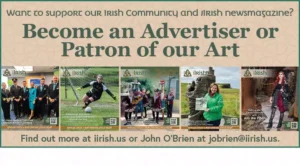
Our Patrons, Subscribers and Advertisers make iIrish possible. Patrons provide funding to support our mission beyond advertising and subscription.
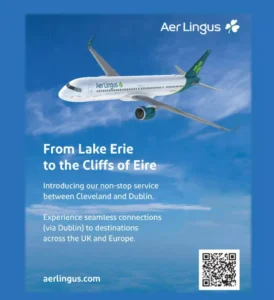
The new issue of iIrish has arrived, get yours from more than 450 locations – the complete list, sorted by zip, is on iIrish.us
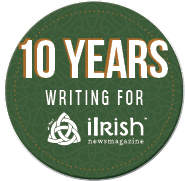
*Francis McGarry holds undergraduate degrees from Indiana University in Anthropology, Education and History and a Masters in Social Science from the University of Chicago. He is the Executive Director of Bluestone Hibernian Charities and proprietor of McGarry Consulting. He is a past president of the Irish American Club East Side and the founder and past president of the Bluestone Division of the Ancient Order of Hibernians.
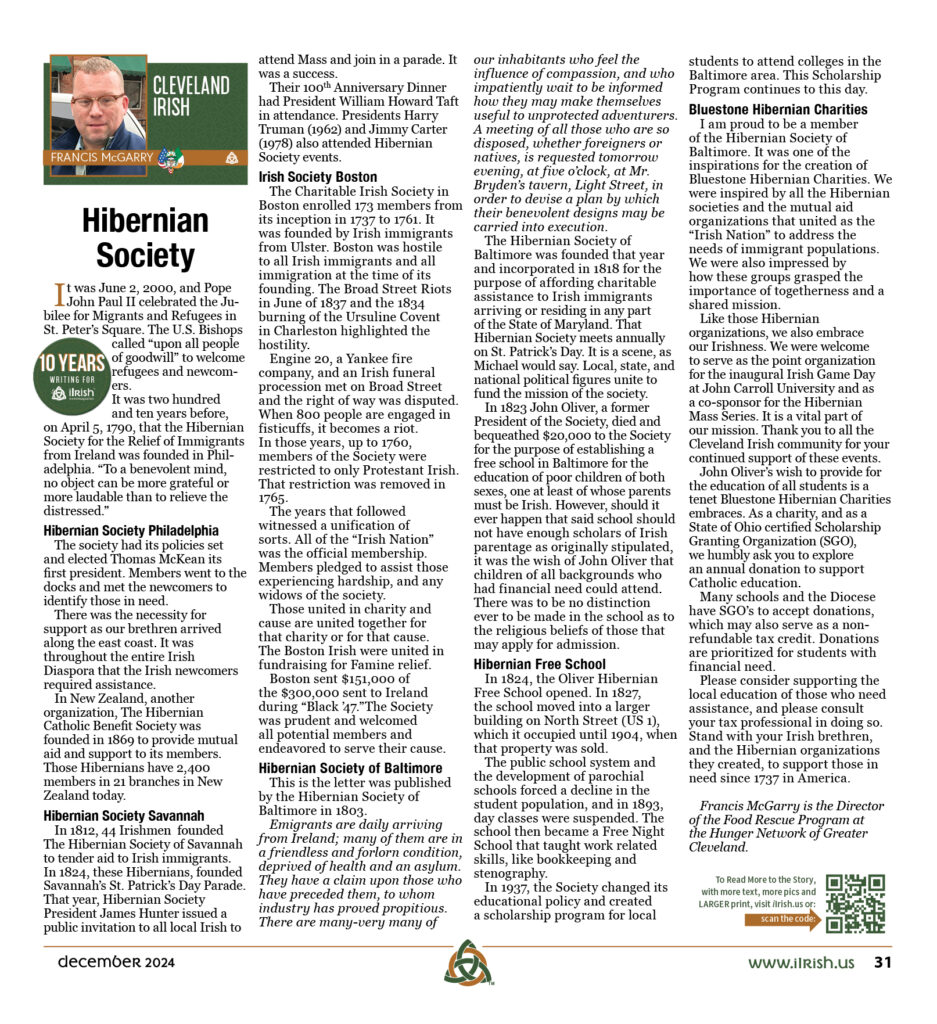
By submitting this form, you are consenting to receive news and event emails from iIrish, 14615 Triskett Road, Cleveland, OH, 44111-3123, US, https://iirish.us. You can revoke your consent to receive emails at any time by using the SafeUnsubscribe® link, found at the bottom of every email. Emails are serviced by Constant Contact.

iIrish now has branded merch! Be an official iIrish Craictivist, or grab other soft, warm, breathable gear.
Click below to visit our store and grab your favorite iIrish gear today!
